人教版六年级上册单词及句型汇总
六年级英语上册人教版第三单元

六年级英语上册人教版第三单元一、重点单词。
1. next week.- 释义:下周,是表示将来时间的短语。
例如:I am going to Beijing next week.(我下周打算去北京。
)2. this morning/afternoon/evening.- 释义:今天上午/下午/晚上。
注意这些短语在句中的时态用法。
如果表示计划或者安排,常用一般将来时。
例如:I'm going to play football this afternoon.(我今天下午打算踢足球。
)3. tonight.- 释义:今晚。
例如:We are going to have a party tonight.(我们今晚打算举办一个派对。
)4. take a trip.- 释义:去旅行。
例如:They are going to take a trip to Shanghai.(他们打算去上海旅行。
)5. go to the cinema.- 释义:去看电影。
例如:She is going to go to the cinema tomorrow.(她明天打算去看电影。
)6. comic book.- 释义:漫画书。
例如:I like reading comic books.(我喜欢看漫画书。
)7. postcard.- 释义:明信片。
例如:He sent me a postcard from Paris.(他从巴黎给我寄了一张明信片。
)二、重点句型。
1. What are you going to do?- 用法:这是一个一般将来时的特殊疑问句,用来询问对方打算做什么。
回答时用“I'm/He's/She's/We're/They're going to +动词原形”的结构。
例如:- A: What are you going to do this weekend?- B: I'm going to visit my grandparents.2. When are you going?- 用法:这也是一般将来时的特殊疑问句,用来询问对方打算做某事的时间。
人教版六年级上册英语知识点
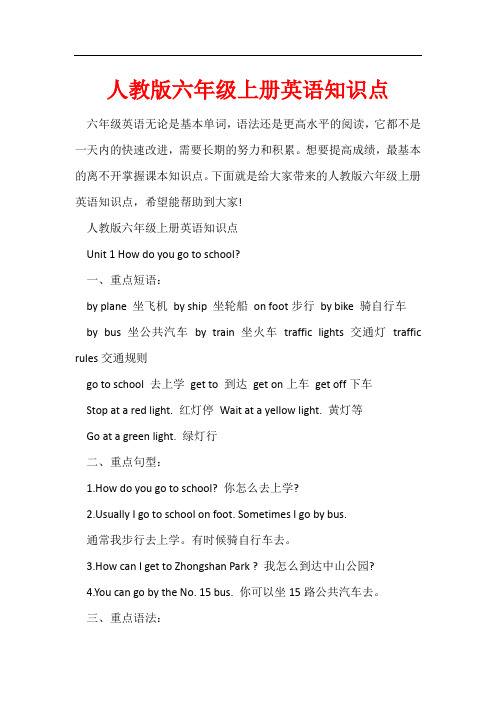
人教版六年级上册英语知识点六年级英语无论是基本单词,语法还是更高水平的阅读,它都不是一天内的快速改进,需要长期的努力和积累。
想要提高成绩,最基本的离不开掌握课本知识点。
下面就是给大家带来的人教版六年级上册英语知识点,希望能帮助到大家!人教版六年级上册英语知识点Unit 1 How do you go to school?一、重点短语:by plane 坐飞机by ship 坐轮船on foot步行by bike 骑自行车by bus 坐公共汽车by train 坐火车traffic lights 交通灯traffic rules交通规则go to school 去上学get to 到达get on上车get off下车Stop at a red light. 红灯停Wait at a yellow light. 黄灯等Go at a green light. 绿灯行二、重点句型:1.How do you go to school? 你怎么去上学?ually I go to school on foot. Sometimes I go by bus.通常我步行去上学。
有时候骑自行车去。
3.How can I get to Zhongshan Park ? 我怎么到达中山公园?4.You can go by the No. 15 bus. 你可以坐15路公共汽车去。
三、重点语法:1、There are many ways to go somewhere.到一个地方去有许多方法。
这里的ways一定要用复数。
因为there are是There be句型的复数形式。
2、on foot 步行乘坐其他交通工具大都可以用介词by…,但是步行只能用介词on 。
4、go to school的前面绝对不能加the,这里是固定搭配。
5、USA 和US 都是美国的意思。
另外America也是美国的意思。
6、go to the park 前面一定要加the. 如果要去的地方有具体的名字,就不能再加the ,如果要去的地方没有具体名字,都要在前面加the. ( go to school除外。
六年级上册英语第四单元人教版
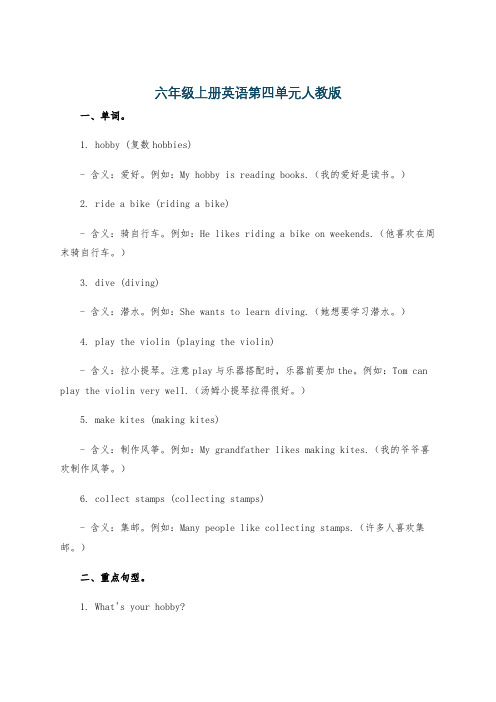
六年级上册英语第四单元人教版一、单词。
1. hobby (复数hobbies)- 含义:爱好。
例如:My hobby is reading books.(我的爱好是读书。
)2. ride a bike (riding a bike)- 含义:骑自行车。
例如:He likes riding a bike on weekends.(他喜欢在周末骑自行车。
)3. dive (diving)- 含义:潜水。
例如:She wants to learn diving.(她想要学习潜水。
)4. play the violin (playing the violin)- 含义:拉小提琴。
注意play与乐器搭配时,乐器前要加the。
例如:Tom can play the violin very well.(汤姆小提琴拉得很好。
)5. make kites (making kites)- 含义:制作风筝。
例如:My grandfather likes making kites.(我的爷爷喜欢制作风筝。
)6. collect stamps (collecting stamps)- 含义:集邮。
例如:Many people like collecting stamps.(许多人喜欢集邮。
)二、重点句型。
1. What's your hobby?- 这是用来询问对方爱好的句型。
回答可以是:My hobby is + 动名词(爱好的活动)。
例如:- A: What's your hobby?- B: My hobby is reading.(我的爱好是阅读。
)2. I like + 动名词(爱好的活动).- 表达自己喜欢做某事。
例如:I like painting.(我喜欢画画。
)3. He/She likes + 动名词(爱好的活动).- 描述他人的爱好。
例如:He likes playing football.(他喜欢踢足球。
人教版PEP英语六年级英语上册各单元单词短语句型全总结
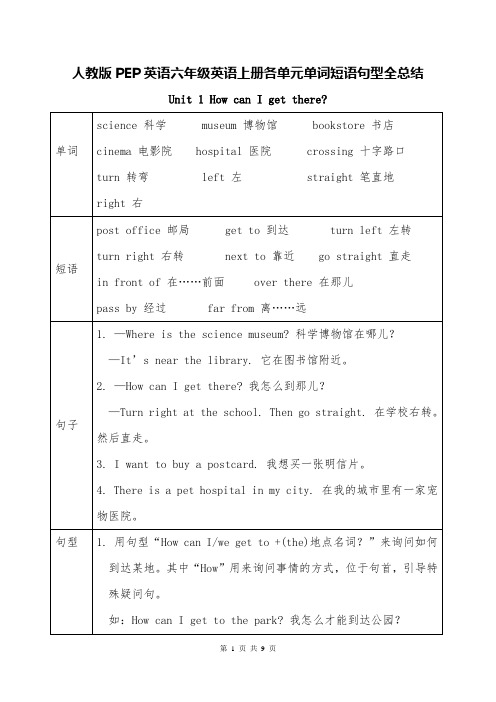
Unit 3 My weekend plan
单词
visit 拜访 film 电影 trip 旅行
supermarket 超市 evening 晚上;傍晚 tonight 在今晚
tomorrow 明天 dictionary 词典 comic 滑稽的
right 右
短语
post office 邮局 get to 到达 turn left 左转
turn right 右转 next to 靠近 go straight 直走
in front of 在……前面 over there 在那儿
pass by 经过 far from 离……远
句子
1. —Where is the science museum? 科学博物馆在哪儿?
businessman 商人;企业家 fisherman 渔民
scientist 科学家 pilot 飞行员 coach 教练
短语
police officer 警察 factory worker 工厂工人
head teacher 校长 look like 看起来像
lots of 许多;大量的 healthy life 健康的生活
—He works in a car factory. 他在一家汽车工厂工作。
Unit 6 How do you feel?
单词
angry 生气的 afraid 害怕 sad 难过的
worried 担心的;发愁的 happy 高兴的 wear 穿
more 更多的 deep 深的 breath 呼吸 count 数数
新人教版PEP小学英语六年级上册各单元知识点总结.doc

人教版 (PEP)小学英语六年级上册单元知识点Unit 1 How can I get there ?一、主要单词:museum 博物馆bookstore 书店cinema 电影院turn 转弯left 向左right 向右straight 笔hospital 医院post office 邮局science科学直地crossing十字路口二、习惯语搭配:post office 邮局science museum科学博物馆pet hospital 宠物医院Italian restaurant 意大利餐馆Beihai Park北海公园Palace Museum 故宫博物院go straight 直走turn right/left 右 / 左转next to 挨着in front of...在...前面near the park 在公园附近on Dongfang Street 在东方大街上三、惯用表达式:Excuse me 打扰一下Follow me, please!请跟着我!四、公式化句型:1、问路的句型及其答语:问句: Where is the + 地点?···在哪儿?答: It's + 表示地点的。
它···。
next to the bookstore, near the hospital/post office,overthere,on Dongfang Street, in front of the school...2、怎么到某地的句型及其答:1 / 17句: How can +主+ get (to)+地点?···怎么到···?同句型:Can you tell me the way to +地点?Where is + 地点?Which isthe way to +地点?答: Turn +方向 +表示地点的介短。
人教版六年级英语上册全部单词+重点句型汇总
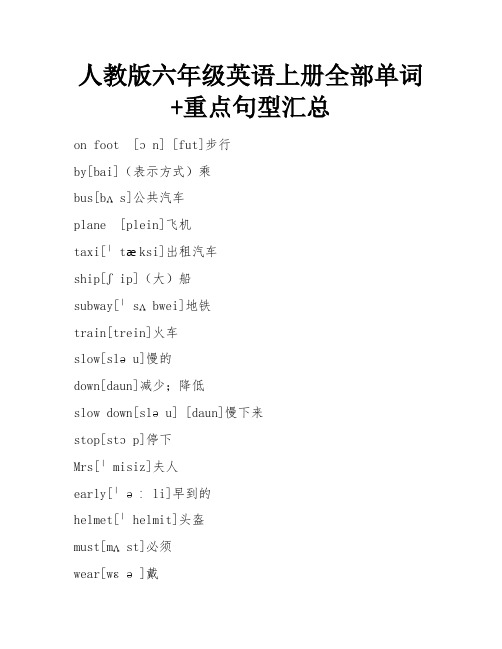
人教版六年级英语上册全部单词+重点句型汇总on foot [ɔn] [fut]步行by[bai](表示方式)乘bus[bʌs]公共汽车plane [plein]飞机taxi[ˈtæksi]出租汽车ship[ʃip](大)船subway[ˈsʌbwei]地铁train[trein]火车slow[sləu]慢的down[daun]减少;降低slow down[sləu] [daun]慢下来stop[stɔp]停下Mrs[ˈmisiz]夫人early[ˈəːli]早到的helmet[ˈhelmit]头盔must[mʌst]必须wear[wɛə]戴attention[əˈtenʃən]注意pay attention to[pei]注意pay[pei] v.付款;给予(注意) n.工资traffic[ˈtræfik]交通traffic lights交通信号灯Munich[ˈmju:nik]慕尼黑(德国城市)Germany[ˈdʒə:məni]德国Alaska[əˈlæskə]阿拉斯加州(美国州名)sled[sled]雪橇fast[fɑ:st]快的ferry[ˈferi]轮渡Papa Westray[,pɑːpəˈwestrei]帕帕韦斯特雷岛Scotland [ˈskɔtlənd]苏格兰1.---How do you e to school? 你怎么上学?----Usually, I e on foot. 通常我走路来的。
2.---How can I get to the Fuxing Hospital? 我怎么能到达复兴医院?----Take the No.57 bus over there. 你可以在那边乘57路公交车。
3. In the USA people on bikes must wear one.在美国骑车的人必须戴头盔。
4. Don’t go at the red light. 别闯红灯。
六年级上册人教版第一单元英语

六年级上册人教版第一单元英语一、主要单词:museum博物馆,bookstore书店,cinema电影院,turn转弯,hospital医院,left向左,post office邮局,science科学,right 向右,straight笔直地,crossing十字路口。
二、惯语搭配:post office邮局,science museum科学博物馆,pet hospital 宠物医院,Italian restaurant意大利餐馆,Beihai Park北海公园,Palace Museum故宫博物院,go straight直走,turn right,left 右,左转,next to挨着,in front of在什么什么前面,near the park 在公园附近,on Dongfang Street在东方大街上。
三、惯用表达式:Excuse me打扰一下Follow me,please!请跟着我!四、公式化句型:1、问路的句型及其答语:问句:Where is the+地点?在哪儿?答语:It’s+表示地点的词语。
它。
next to the bookstore,near the hospital,post office,over there,on Dongfang Street,in front of the school2、询问怎么到某地的句型及其答语:问句:How can+主语+get(to)+地点?什么怎么到什么?同义句型:Can you tell me the way to+地点?Where is+地点?Which is the way to+地点?答语:Turn+方向+表示地点的介词短语。
转。
at the cinema at the corner near the post office.5、例句:Where is the cinema,please?请问电影院在哪里?It's next to the hospital.它与医院相邻。
人教版(PEP)小学英语六年级上册各单元知识点归纳(三年级起点)
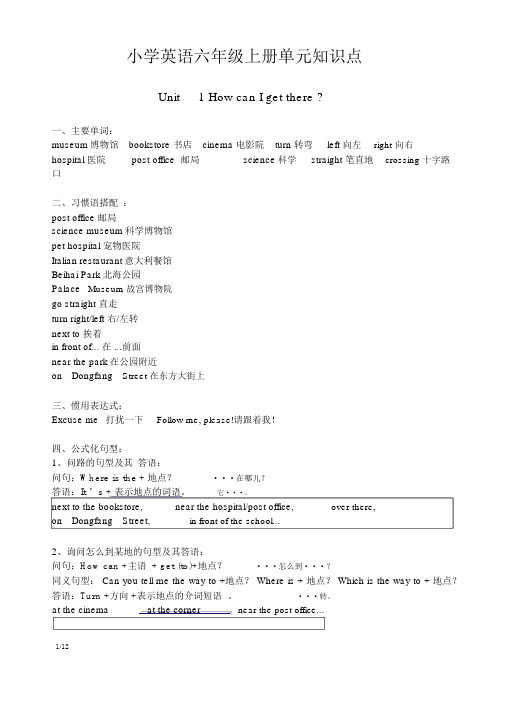
小学英语六年级上册单元知识点Unit 1 How can I get there ?一、主要单词:museum博物馆bookstore 书店cinema 电影院turn 转弯left 向左right 向右hospital 医院post office 邮局science科学straight 笔直地crossing 十字路口二、习惯语搭配:post office 邮局science museum科学博物馆pet hospital 宠物医院Italian restaurant意大利餐馆Beihai Park 北海公园Palace Museum 故宫博物院go straight 直走turn right/left 右/左转next to 挨着in front of... 在 ...前面near the park在公园附近on Dongfang Street 在东方大街上三、惯用表达式:Excuse me打扰一下Follow me, please!请跟着我!四、公式化句型:1、问路的句型及其答语:问句:Where is the + 地点?···在哪儿?答语:It ’s + 表示地点的词语。
它···。
next to the bookstore,near the hospital/post office,over there,on Dongfang Street,in front of the school...2、询问怎么到某地的句型及其答语:问句:How can +主语 + get (to)+地点?···怎么到···?同义句型: Can you tell me the way to +地点? Where is + 地点? Which is the way to + 地点?答语:Turn +方向 +表示地点的介词短语。
人教版小学英语六年级上册知识清单(全)

人教版小学英语六年级上册知识清单(全)小学英语六年级(上)单元必备知识清单Unit1 How Do You Go There?一、重点单词及短语:by经......,乘...... / foot脚(复数feet)/bike自行车/ bus公共汽车/train火车/plane飞机/ship轮船/subway地铁/how怎样,如何/go to school去上学/then然后/traffic交通/traffic light交通灯/traffic rule交通规则/stop停/wait等/get to到达/country国家(复:countries)drive驾驶/England英国/Australia澳大利亚/if如果/must必须/know知道※频度副词:always总是(100%)>usually通常(80%)>often通常(60%)>sometimes 有时候(40%)>hardly ever几乎不(20%)>never决不,从不(0%)※同音异义词:1.by经......,乘....../ buy购买/bye再见2.know知道/no不※反义词:different不同的—same相同的right右边的—left左边的二、重点句型:1、How do you go to school,Sarah?你怎么去上学,萨拉?2、Usually I go to school on foot.=I usually go to school on foot.我通常走路去上学。
3、Sometimes I go(to school) by bike.起地 comic book漫画书 post card明信片 newspaper报纸 magazine杂志 dictionary字典(复:dictionaries) shoe store鞋店 fruit stand 水果摊 pet shop宠物商店 need需要 plant(名)植物;(动)种植 else 其他一、重点句型:1.What are you going to do on the weekend?周末你打算干什么?2.I’m going to visit my grandparents this weekend.我打算这周末去看望我的(外)祖父母。
新人教版PEP小学英语六年级上册各单元知识点总结
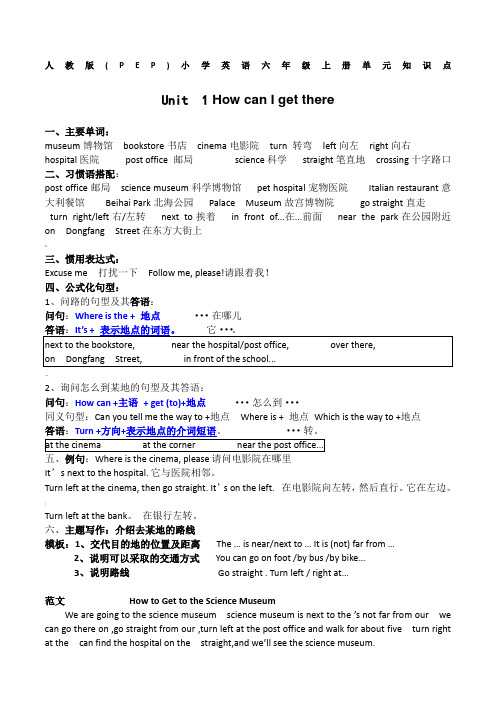
人教版(P E P)小学英语六年级上册单元知识点Unit1 How can I get there一、主要单词:museum博物馆bookstore书店cinema电影院turn 转弯left向左right向右hospital医院post office 邮局science科学straight笔直地crossing十字路口二、习惯语搭配:post office邮局science museum科学博物馆pet hospital宠物医院Italian restaurant意大利餐馆Beihai Park北海公园Palace Museum故宫博物院go straight直走turn right/left右/左转next to挨着in front of...在...前面near the park在公园附近on Dongfang Street在东方大街上~三、惯用表达式:Excuse me 打扰一下Follow me, please!请跟着我!四、公式化句型:1、问路的句型及其答语:问句:Where is the + 地点···在哪儿·2、询问怎么到某地的句型及其答语:问句:How can +主语+ get (to)+地点···怎么到···同义句型:Can you tell me the way to +地点Where is + 地点Which is the way to +地点五、例句:Where is the cinema, please 请问电影院在哪里It’s next to the hospital. 它与医院相邻。
Turn left at the cinema, then go straight. It’s on the left. 在电影院向左转,然后直行。
它在左边。
:Turn left at the bank。
(完整word版)PEP人教版六年级英语上册各单元复习要点
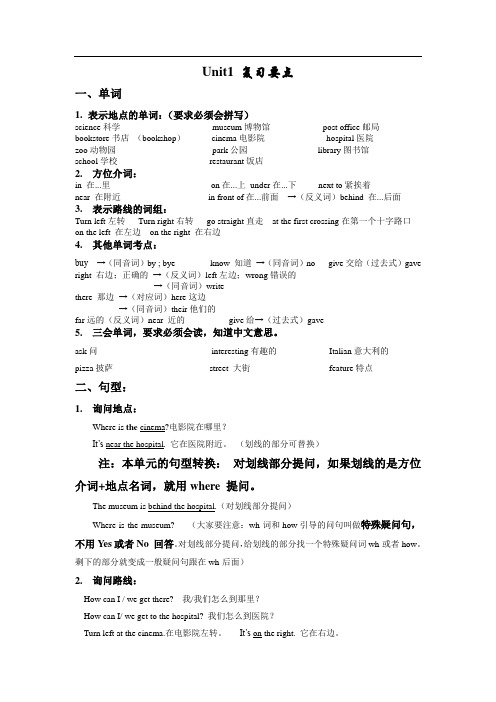
Unit1 复习要点一、单词1.表示地点的单词:(要求必须会拼写)science科学museum博物馆post office邮局bookstore书店(bookshop)cinema电影院hospital医院zoo动物园park公园library图书馆school学校restaurant饭店2.方位介词:in 在...里on在...上under在...下next to紧挨着near 在附近in front of在...前面→(反义词)behind 在...后面3.表示路线的词组:Turn left左转Turn right右转go straight直走at the first crossing在第一个十字路口on the left 在左边on the right 在右边4.其他单词考点:buy →(同音词)by ; bye know 知道→(同音词)no give交给(过去式)gave right 右边;正确的→(反义词)left左边;wrong错误的→(同音词)writethere 那边→(对应词)here这边→(同音词)their他们的far远的(反义词)near 近的give给→(过去式)gave5.三会单词,要求必须会读,知道中文意思。
ask问interesting有趣的Italian意大利的pizza披萨street 大街feature特点二、句型:1.询问地点:Where is the cinema?电影院在哪里?It’s near the hospital. 它在医院附近。
(划线的部分可替换)注:本单元的句型转换:对划线部分提问,如果划线的是方位介词+地点名词,就用where 提问。
The museum is behind the hospital.(对划线部分提问)Where is the museum? (大家要注意:wh-词和how引导的问句叫做特殊疑问句,不用Yes或者No 回答。
人教版小学六年级上册英语知识点【各单元】
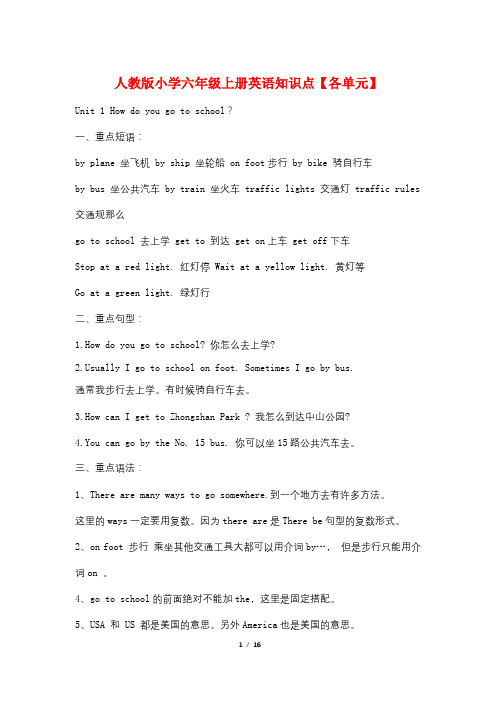
人教版小学六年级上册英语知识点【各单元】Unit 1 How do you go to school?一、重点短语:by plane 坐飞机 by ship 坐轮船 on foot步行 by bike 骑自行车by bus 坐公共汽车 by train 坐火车 traffic lights 交通灯 traffic rules 交通规那么go to school 去上学 get to 到达 get on上车 get off下车Stop at a red light. 红灯停 Wait at a yellow light. 黄灯等Go at a green light. 绿灯行二、重点句型:1.How do you go to school? 你怎么去上学?ually I go to school on foot. Sometimes I go by bus.通常我步行去上学。
有时候骑自行车去。
3.How can I get to Zhongshan Park ? 我怎么到达中山公园?4.You can go by the No. 15 bus. 你可以坐15路公共汽车去。
三、重点语法:1、There are many ways to go somewhere.到一个地方去有许多方法。
这里的ways一定要用复数。
因为there are是There be句型的复数形式。
2、on foot 步行乘坐其他交通工具大都可以用介词by…,但是步行只能用介词on 。
4、go to school的前面绝对不能加the,这里是固定搭配。
5、USA 和 US 都是美国的意思。
另外America也是美国的意思。
6、go to the park 前面一定要加the. 如果要去的地方有具体的名字,就不能再加the ,如果要去的地方没有具体名字,都要在前面加the. ( go to school 除外。
)7、How do you go to …?你怎样到达某个地方?如果要问的是第三人称单数,那么要用:How does he/she…go to …?8、反义词:get on(上车)---get off(下车) near(近的)—far(远的) fast(快的)—slow(慢的)because(因为)—why(为什么) same(相同的)—different(不同的)9、近义词:see you---goodbye sure---certainly---of course10、频度副词:always 总是,一直 usually 通常 often经常 sometimes 有时候 never 从来不针对练习I.中英互译:boat_________ taxi_______ motorbike _______ bus _______地铁轮船飞机火车附近走路骑单车上学because_______ by car _______ sometimes________ often________II.用in,on,under,by,near填空。
英语六年级上册知识点人教版总结
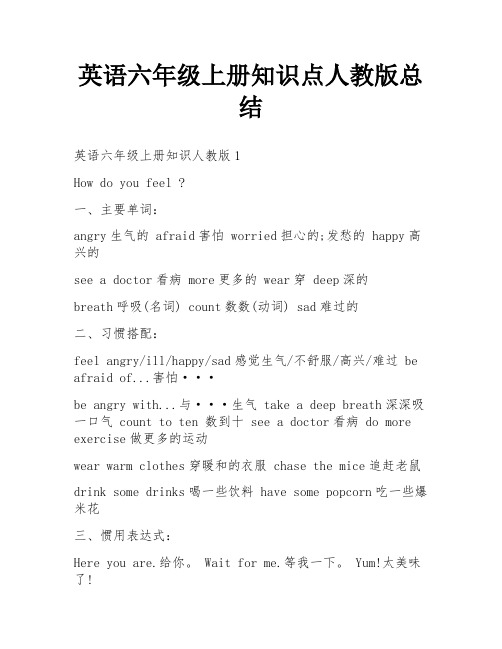
英语六年级上册知识点人教版总结英语六年级上册知识人教版1How do you feel ?一、主要单词:angry生气的 afraid害怕 worried担心的;发愁的 happy高兴的see a doctor看病 more更多的 wear穿 deep深的breath呼吸(名词) count数数(动词) sad难过的二、习惯搭配:feel angry/ill/happy/sad感觉生气/不舒服/高兴/难过 be afraid of...害怕···be angry with...与···生气 take a deep breath深深吸一口气 count to ten 数到十 see a doctor看病 do more exercise做更多的运动wear warm clothes穿暖和的衣服 chase the mice追赶老鼠drink some drinks喝一些饮料 have some popcorn吃一些爆米花三、惯用表达式:Here you are.给你。
Wait for me.等我一下。
Yum!太美味了!四、公式化句型:1、描述某人/某物害怕什么的句型:主语+be动词+afraid of +其他. ···害怕···。
2、描述某人/某物与什么生气的句型:主语+be动词+angry with+其他. ···与···生气。
3、询问某人怎么了的句型及其答语:问句:What’s wrong? What’s the matter(with you)? 怎么了?答语:某人+所处的状况。
4、建议某人应该做某事的句型某人+should +动词(短语)原形+其他. ···应该···。
人教版英语六年级上册一单元知识点
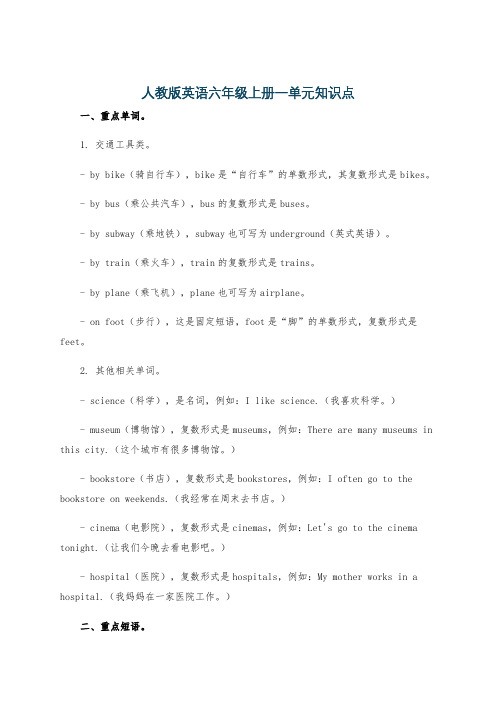
人教版英语六年级上册一单元知识点一、重点单词。
1. 交通工具类。
- by bike(骑自行车),bike是“自行车”的单数形式,其复数形式是bikes。
- by bus(乘公共汽车),bus的复数形式是buses。
- by subway(乘地铁),subway也可写为underground(英式英语)。
- by train(乘火车),train的复数形式是trains。
- by plane(乘飞机),plane也可写为airplane。
- on foot(步行),这是固定短语,foot是“脚”的单数形式,复数形式是feet。
2. 其他相关单词。
- science(科学),是名词,例如:I like science.(我喜欢科学。
)- museum(博物馆),复数形式是museums,例如:There are many museums in this city.(这个城市有很多博物馆。
)- bookstore(书店),复数形式是bookstores,例如:I often go to the bookstore on weekends.(我经常在周末去书店。
)- cinema(电影院),复数形式是cinemas,例如:Let's go to the cinema tonight.(让我们今晚去看电影吧。
)- hospital(医院),复数形式是hospitals,例如:My mother works in a hospital.(我妈妈在一家医院工作。
)二、重点短语。
1. 交通方式表达。
- take a bus(乘公共汽车),等同于by bus,但在句子中的用法有所不同。
例如:I take a bus to school. = I go to school by bus.(我乘公共汽车去上学。
)- take the subway(乘地铁),例如:He takes the subway to work every day.(他每天乘地铁去上班。
小学人教版六年级英语上册复习要点

六年级上册复习要点Unit1 How can I get there?一、重点单词:地点:science museum科学博物馆post office 邮局bookstore 书店cinema 电影院hospital 医院动作:go straight 直走turn left/right 左转、右转方位:in front of :在···前面behind 在···后面near在…旁边next to 紧挨着beside 在旁边over 在…上方on the left 在左边on the right 在右边二、重点句型:(1)Is / Are there…?某处有某物吗?肯定回答:Yes, there is/are. 否定回答:No, there isn’t/aren’t. (2)Where is the + 地点?... ... 在哪里?It’s + 表示地点的名词. 它... ...例句:Where is the cinema? 电影院在哪?It’s next to the bookstore. 在书店的旁边。
(3)How can + 主语+get(to)+ 地点? ... ...怎么到... ...?(如果get后面接的词为副词,则要省略介词to.)例句:How can we get to the park?How can we get there? 我们怎么到那儿?同义句型:Can you tell me the way to + 地点?( 4 )Where is + 地点?Which is the way to + 地点?( 5 ) Turn left at the bookstore. 到书店左转。
Unit 2 Ways to go to school?一、重点单词/短语:交通方式:by bike /bus /plane /subway /train /ship /taxi /ferry骑自行车/乘公共汽车/飞机/地铁/火车/船/出租汽车/轮渡take the No.57 bus 乘57路公共汽车on foot 步行其他:slow down慢下来pay attention to 注意traffic lights 交通信号灯look right 向右看cross the road 横穿马路at home 在家二、重点句型:(1)How do you come (to) + 地点?你们怎么来... 的?I usually/ often/sometimes .. ... 我通常/经常/有时...How do you go(to) + 地点?你们怎么去...的?How do you get (to) + 地点?你们怎么到达...的?(频度副词:频度副词又称频率副词,用来表示事情发生的频率,即某事多长时间发生一次。
人教版六年级上册英语单词和句型总结

六年级上册单词和句型总结Unit 1: You should obey the rules单词:Student, everyone, obey, rule, teacher, listen, carefully, noise, group leader, list, homework, question, quite, sometimes, mess, dinner table, evening, desk, cross, road, wait, grass, pick, flower, spit, litter, street, sign, classmate, social, hospital, rabbit, beautiful, hungry, throw, banana, ground 句子:1.He knows everyone in school should obey the rules.2.He comes to school early.3.He listens to his teacher carefully.4.He never makes noise in class.5.He’s a group leader.6.His group is making a list of rules for the class.7.Don’t be late for class/school.8.Hand in your homework on time9.May I ask you a question?10.Ask questions actively.11.Don’t make noise in class.12.Be quite.13.Don’t eat in class.14.Do you think they are right?15.Tell them to obey the school rules.16.On a cool afternoon, we go to the Moon School.17.Don’t bring the cool food. We should obey the rule.18.Peter is a good student at school. But sometimes he is not a good boy at home.19.He often makes a mess in his room.20.He doesn’t like to help to set the dinner table.21.He watches TV the whole evening.22.He reads in bed and he goes to bed very late.23.Peter’s mother writes some home rules for him.24.You should go to bed early.25.You should keep your room clean.26.You shouldn’t read in bed.27.You shouldn’t watch TV till late.28.You shouldn’t make a mess in your room.29.Keep your desk clean30.We shouldn’t go home too late.31.If you can’t write, just draw pictures.32.Look out! You mustn’t cross the road now.33.You must wait for the green light.34.You mustn’t spit on the ground.35.You must keep off the grass.36.You mustn’t pick the flowers.37.You mustn’t litter.38.We must take good care of young children.39.respect old people and help them40.keep off the grass41.play on the street42.Make a sign to tell people what they must do.43.Mickey and their classmates are going on a social studies field trip.44.They come to a hospital / a busy street / a beautiful park.45.The rabbit puts her sign in front of the hospital. She wants to tell people, “Be quiet.”46.The dog holds up his/a sign to tell people, “No crossing!”47.Mickey points to his sign to tell people, “No littering.”48.Mickey feels hungry. He eats a banana. Then he throws the banana skin on the ground.49.What is wrong with Micky? What are his classmates doing now?Unit 2 I usually go to school by bus.E-mail, subject, daily, homework, morning, evening, breakfast, remember, note, picture, tick, click, family, doctor, grandma, grandpa, photo, newspaper, garden, cinema, piano, bike, granny, famous, scientist, office, secretary, question, quick, shopping, seldom, meal, lab, interview, whole, sweetly, lab, artist句子:1.What are you doing?2.I’m reading an e-mail from Lucy.3.She’s my new friend.4.Can I read it?5.Let me tell you something about my daily life.6.I get up at seven every morning.7.I go to school at twenty past eight.8.School begins at nine.9.I have classes from 9:00 to 11:30.10.I bring a lunch box to school.11.School ends at three.12.I get home at about half past three.13.I do my homework.14.I get home at about half past three.15.I have dinner at about seven.16.After dinner, I watch TV.17.I go to school at 7:00 in the morning.18.I go to bed at 9:00 in the evening.19.Please e-mail me back.20.Best wishes.21.have breakfast/ lunch/ dinner22.get up, go to school, have classes, go home, watch TV, go to bed23.Talk about your daily life in pairs.24.While you are talking, remember to make notes.25.If you can’t write, you can draw pictures.26.I was glad to get/ read your e-mail.27.Let me tell you something about my family.28.My family lives in Kunming.29.My grandpa is very kind to me.30.I love him very much.31.These photos are about his daily life.32.He takes a long walk from 6:15 to 7:00.33.He reads the newspapers.34.In the afternoon, he usually waters the flowers in his garden or plays with his petdog.35.He doesn’t go out in the evening.36.He goes to bed at about 9:00.37.I don’t go out in the evening. He/ She doesn’t go out in the evening.38.go to the cinema, play the piano, go shopping, stay up very late39.Bring a few photos of your family or friends and talk about them in groups.40.They are going on a social studies field trip(社会学科田野考察).41.They want to know about a famous scientist.42.But the scientist, Mr. Li, isn’t in his office. So they talk with his secretary.43.May I ask you some questions about Mr Li’s daily life?44.He usually works in the office in the morning.45.He often works from 6:00 to 12:00. Then he has a quick lunch.46.What does he usually do in the afternoon?47.He usually goes on with his work.48.Sometimes he meets other scientists.49.Does he often go shopping?50.He seldom goes shopping.51.He never eats out.52.He always has his meals in the office, or even in the lab.53.How hard he works!54.We should learn from him.55.begin to work, meet other scientists, have meals in the office56.always- usually- often- sometimes- seldom- never57.Tom’s father is a famous artist.58.What do you want to know about him?59.Can we ask you some questions?60.Do you usually get up early?61.What do you usually do in the morning?62.Do you work in the evening?63.Are you interested in music?64.He often paints the whole morning.65.He works till very late in the evening.66.He seldom listens to music.67.How can the bird sing so sweetly?68.She gets up early and sings the whole morning.69.But Micky just makes noise.70.He knows he cannot sing sweetly.71.He feels sad.72.The bird flies to Mickey.73.She gives him a good idea.74.What’s the bird’s idea?75.Can you guess?Unit 3 What’s your hobby?单词:everybody, hobby, collect, stamp, interest, basketball, type, super, candy paper, colourful, toy car, picture card, table tennis, volleyball, football, vegetable, plant, animal, chicken, duck, goose, fish, raise, leaf, shape, paint, glue, dip, press, fingerprint, finger painting, worm, carrot, piece, trace, tomato, cucumber, invitation, Australia, sandwich, sentence, winner, score, Monday, Tuesday, Wednesday, Thursday, Friday, rubbish, dustbin, recycle, airport, allow, beach, dirty,1.Everybody has hobbies.2.Do you like collecting stamps?3.Are you interested in listening to music?4.Do you enjoy playing basketball?5.Peter’s hobby is collecting toy cars.6.There is a toy shop near Peter’s home.7.There is a new type of toy car in the shop.8.I’m going to buy one.9.What’s your hobby? My hobby is singing.10.I’m interested in collecting stamps.11.I have an interesting hobby.12.Look! This is my book of candy paper.13.So many types of candy paper! So colorful and so nice!14.I like listening to music. He likes playing football.15.My grandpa lives on a farm.16.He has some interesting hobbies.17.Do you want to know something about him?18.He enjoys farming.19.He enjoys planting flowers and growing vegetables.20.He also likes keeping animals.21.What animals does he keep?22.He keeps chickens, ducks and some geese.23.My grandpa also enjoys fishing.24.Is he good at fishing?25.Sometimes he goes fishing for the whole day but catches nothing.26.Isn’t that funny?27.My grandpa’s hobby is fishing.28.My grandpa enjoys growing vegetables/ making tools / planting flowers/ raising animals.29.Let’s ask Peter about his father’s hobby.30.What questions should we ask?31.Gao Wei’s mother likes cooking.32.My uncle’s hobby is collecting CDs.33.Different people have different hobbies.34.He often makes interesting things by painting.35.He wants to show us how to make leaf paintings.36.Do you know leaf paintings? I’ll show you how to make them:1)First, collect some leaves. Then, get a piece of paper.2)Put a leaf on the paper. And then trace the shape of the leaf.3)Do the same with the other leaves.4)When you finish the drawings, you can paint them in different colors.5)Now you can make your own leaf paintings!37.Get some paints and paper. Draw a house on the white paper. Paint the house. Cut it out. Glueit onto the yellow paper. Look! We have a nice picture.38.Let’s do finger painting.1) First, get some paper and paints.2) Dip your finger in the paint.3) Press your finger on the paper to make a print.4) Make a few fingerprints.5) Draw animals’ and children’s faces on them.6) We have finger paintings.39.The animals are talking about their hobbies.Unit 4: Will you come to my birthday party?单词:birthday, October, invite, first, second, third, fourth, fifth, sixth, seventh, eighth, ninth, tenth, square, ice cream, jelly, balloon, biscuit, triangle, rectangle, celebrate, cone, candle, fruit, candy, juice, computer, elephant, gift, triangle, square, rectangle, biscuits,句子:1.Lisa’s birthday is on October 20th.2.She is going to have a birthday party.3.She wants to invite Peter to her birthday party.4.I’d like to invite you to my birthday party.5.When is it?6.Will you come to my party? Sure! I’d love to.7.What day is it on? It’s on Thursday.8.We can celebrate after school.9.My mum will come and pick us up.10.Will you come to my birthday party?11.I will have a party on Oct 20th.12.Make an invitation card. Then give it to a friend.13.Don’t forget to write your friend’s name on it, and sign your name, too.14.Here’s a card for you.15.Lisa’s uncle and aunt go shopping with Lisa.16.They want to buy a birthday cake and some other things for her birthday party.17.What kind of cake would you like?18.I’d like that round cake. How nice!19.What shape would you like? A round one or a square one?20.It looks lovely.21.Let’s get some ice cream.22.I’ll get some jelly for you.23.Can we get some round balloons and long balloons, too?24.I’ll have a great birthday party.25.I’ll get some ice cream for you.26.Who has a birthday in October?27.Let’s celebrate together/ make party hats.28.I’ll make my hat from 3 triangles.29.I’ll make a hat with a circle and a rectangle.30.I’ll make a cone hat.31.Peter and Kate come to Lisa’s home.32.They’re going to celebrate Lisa’s birthday.33.They give their presents to Lisa and Lisa feels very happy.34.The birthday party begins.35.They light the candles on the cake and sign the birthday song.36.Lisa makes a wish and then she blows out the candles.37.Lisa cuts the cake and gives each one a piece.38.The children also have fruit and candies. They have a good time!39.Would you like a cup of tea? Yes, please. / No, thanks. I’d like a glass of juice.40.Let’s light the cansles.41.I want to have a computer.42.He wants to know who else has a birthday on the same day.43.So they have a big birthday party.Unit 5: December is the last month.单词:January, skate, February, the Spring Festival, holiday, celebrate, children, everywhere, Tree Planting Day, March, April, fourth, Sunday, Easter, second, third, May, June, July, August, September, October, November, December, usually, Labour Day, Mother’s Day, perform, Father's Day, exam, camp, summer holiday, lord, Teacher's Day, National Day, America, Thanksgiving Day, Thursday, Christmas, Santa Claus, present, tomorrow, climb,句子:1.There are twelve months in a year.2.January is the first month.3.The first day, January 1st, is called New Year’s Day.4.Look! The children are skating.5.February is the second month of the year.6.In China, the Spring Festival is in January or February.7.Students have their winter holiday in February.8.The children are celebrating the Spring Festival.9.People can see green leaves and green grass everywhere.10.In China, Tree Planting Day is on March 12th.11.April is the fourth month of the year. Easter is in March or April.12.It can be on any day from March 20th to April 20th.13.Easter is always on a Sunday. During Easter, children get colorful Easter eggs.14.The students have their exams in July.15.The boy is working hard on his studies.16.Students have their summer holiday.17.The students are going camping.18.Students go back to school.19.The girl is playing the piano for the Teachers’ Day party.20.In America, Thanksgiving Day is on the 4th Thursday of November.21.Get a piece of paper. Fold the paper. Cut out a small window. Draw a picture like this. Write agreeting.22.Santa Claus is giving the children presents.23.Mimi gives Micky a good book as a New Year gift.24.March 1st is the first day of the third of the year.25.Micky is climbing up a tree. He isn’t reading the book.26.But I want to read tomorrow.27.Micky is playing in the tree.28.What is the book about? What is Micky thinking of?Unit 6: Winter is the white season.单词:springtime, around, cherry, apple, pear, peach, rainy, weather, themselves, sandcastle, shell, summertime, beach, autumn, yellow, brown, harvest, season, sweep, snowman, boat, monkey, wintertime, calendar, hemisphere, Britain, France, Germany, Russia, USA, Canada, Christmastime, South Africa, barbeque,句子:1.There are four seasons in a year. Spring is the first season.2.In China springtime begins around March.3.It is still a little cold, but it gets warmer and warmer. And the days get longer and longer.4.The trees have new green leaves.5.There are lots of new flowers on the cherry trees, apple trees, pear trees and peach trees.6.The animals come out from their long sleep.7.The birds sing to welcome the spring.8.What are they doing? They are looking at the flowers/ farming the land.9.Are they planting seeds? Yes, they are.10.Are they flying kites?11.Summer is the second season of the year.12.The weather is hot and sometimes rainy.13.It is the hottest season.14.In summer, school closes.15.Some students go to the beach and enjoy themselves.16.Is he planting rice? Yes, he is. / No, he isn’t.17.Is she making/ painting a sandcastle? No, she isn’t. She’s looking for shells.18.Autumn begins around September.19.The weather gets cooler and cooler.20.The days get shorter and shorter.21.Autumn is the gold season.22.The leaves on the trees are yellow and brown.23.The farmers are busy harvesting.24.They are picking apples.25.When it snows, everything is white. The white world is really beautiful.26.Look, the children are playing with snow.27.cut rice, feed the animals, sweep the snow, make a snowman, cut the grass28.What season is it in New Zealand?29.What is the weather like?30.The animals are going camping.31.Mimi and Micky are boating on the river.32.Micky is looking into the water.33.What are you looking at? I’m looking at another monkey. He’s in the water.34.How many months are there in a year?35.I’ll give my mother a present for Mother’s Day.。
人教口语六年级上册人教版
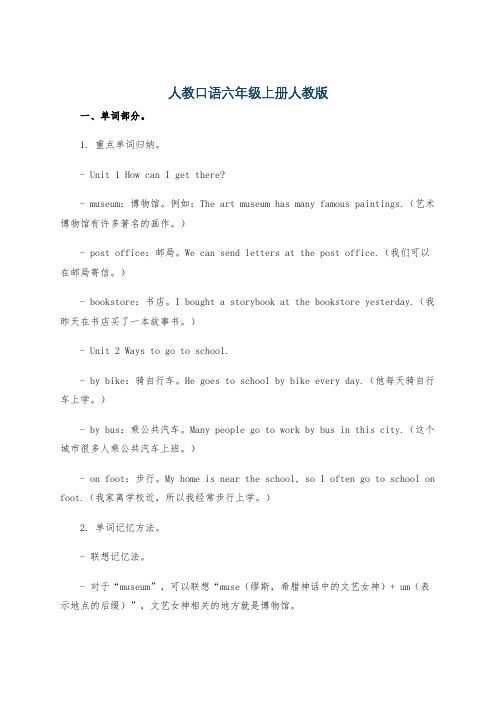
人教口语六年级上册人教版一、单词部分。
1. 重点单词归纳。
- Unit 1 How can I get there?- museum:博物馆。
例如:The art museum has many famous paintings.(艺术博物馆有许多著名的画作。
)- post office:邮局。
We can send letters at the post office.(我们可以在邮局寄信。
)- bookstore:书店。
I bought a storybook at the bookstore yesterday.(我昨天在书店买了一本故事书。
)- Unit 2 Ways to go to school.- by bike:骑自行车。
He goes to school by bike every day.(他每天骑自行车上学。
)- by bus:乘公共汽车。
Many people go to work by bus in this city.(这个城市很多人乘公共汽车上班。
)- on foot:步行。
My home is near the school, so I often go to school on foot.(我家离学校近,所以我经常步行上学。
)2. 单词记忆方法。
- 联想记忆法。
- 对于“museum”,可以联想“muse(缪斯,希腊神话中的文艺女神)+ um(表示地点的后缀)”,文艺女神相关的地方就是博物馆。
- 对比记忆法。
- 对比“by bike”“by bus”“on foot”,可以通过出行方式的不同工具或者方式来区分。
“by +交通工具”表示乘坐某种交通工具,而“on foot”是特殊的步行表达。
二、句型部分。
1. 重点句型汇总。
- Unit 1.- “Where is the...?”(……在哪里?)例如:Where is the library?(图书馆在哪里?)- “It's near/next to/behind... ”(它在……附近/旁边/后面……)It's next to the cinema.(它在电影院旁边。
- 1、下载文档前请自行甄别文档内容的完整性,平台不提供额外的编辑、内容补充、找答案等附加服务。
- 2、"仅部分预览"的文档,不可在线预览部分如存在完整性等问题,可反馈申请退款(可完整预览的文档不适用该条件!)。
- 3、如文档侵犯您的权益,请联系客服反馈,我们会尽快为您处理(人工客服工作时间:9:00-18:30)。
六年级上册词汇L1go back /went back 返回,回到Canada 加拿大do (did) 做have(had) a great time 过得很开心thing东西,事情visit(visited) 看望,参观,拜访play(played) 玩work(worked)工作,干活just仅仅,只stay(stayed) 待,停留learn(learned) 学习Peking Opera 京剧go swimming(went swimming) 去游泳no wonder难怪,怪不得strong 强壮的both (两者)都interesting 有趣的vacation 假期write(wrote)a story 写故事make(made) a cake 做蛋糕L2when什么时候camp露营,营地last Thursday上个周四swim(swam) 游泳is(was) 是take(took) 拿,带,花费come(came)back 回来give(gave) 给climb(climbed)爬mountain 山river河go (went ) fishing去钓鱼catch(caught ) 抓住,接住let(let) 让hour小时finish(finished )完成the piano lesson 钢琴课go (went)to the airport去机场only仅仅,只farm农场some一些L3a pair of Chinese shoes一双中式鞋win(won) the football match 赢了足球比赛miss想念next下一个like(liked) 喜欢glasses眼镜please请problem 问题buy(bought )买best 最好的enjoy喜欢,欣赏,享受return the book还书L5happen(happened)发生neck脖子ache疼terribly很,非常stand(stood)站hurt(hurt) 受伤,伤到practice kung fu练习功夫be interested in 对---感兴趣think(thought) 想,认为easy容易的,简单的isn’t(wasn’t)不是stand on your head 倒立dangerous危险的lucky 幸运的break(broke)打破,弄坏L6 scratch(scratched) 抓伤,擦伤be worried about 焦虑,担心,烦恼be careful 小心have to(had to )必须,不得不match 比赛upset 难过的,失望的,沮丧的cut(cut) 切,割,剪won’t=will not 不会,不将myself我自己soup汤young年轻的,幼小的but 但是L7breakfast早饭lunch午饭supper=dinner晚饭chocolate巧克力himself(herself)他(她)自己)fall(fell)跌倒,落下来cry(cried)哭,喊hard努力,使劲smoke(smoking)吸烟play computer game玩电脑游戏exercise练习,锻炼stop doing 停止做某事should应该say said说need 需要,必要pill药丸,药片eat ate 吃Cookies饼干honey 蜜,蜂蜜a piece of cake一块蛋糕rice 米饭bowl 碗drink drank喝stomachache肚子疼,胃疼why 为什么L9angry生气的are(were) 是hotel宾馆,饭店take (took) a trip去旅行last weekend 上周末miss(missed) 想念,错过flight飞行,航班late晚的,迟到的fly(flew)飞,放(风筝))find(found) 找到,发现leave (left) 离开,遗留passport护照hear(heard) 听见,听到must 必须,一定drive(drove)开车,驾驶take(took)the trainL10fantastic 极好的by air (by plane) 坐飞机place 地方bridge 桥special 特殊的do some shopping 购物silk 丝绸by bus 坐公交车by subway 坐地铁by taxi 坐出租车by train坐火车on foot走着the train station 火车站the Spring Festival Fair 春节庙会hill 小山the West Lake 西湖around 在--周围,围绕green tea 绿茶L11vehicle 车辆,交通工具invention 发明(名词)life 生活,生命,人生comfortable舒适的safe 安全的fast 快telephone (phone)电话yesterday afternoon昨天下午on Friday morning 在周五早晨see(saw) 看到,看见travel旅行many years ago 许多年前ship 轮船slow 慢的difficult 难的,困难的invent(invention ) 发明walk (walked) 走路,散步ride(rode)骑horse马smart 聪明的make(made) 做,制造,使得On Monday 在周一many 许多L15BC公元前AD公元后ancient古老的,古代的be different from与---不同can (could) 能,会,可以fair公平的begin(began)开始Greece 希腊city城市all over the country全国the Tang Dynasty唐朝think(thought) 想,认为history历史modern现代的these,those 这些,那些hold(held) 举行,举办L16a long time ago很久以前shame羞愧Athens雅典Olympic Games 奥运会woman(women)女人man(men)男人take part in (took)part in 参加hold(held) 举行,举办stop(stopped) 停止different不同的meet 遇见,见面L17success成功medal奖牌athlete运动员gold金,黄金silver银bronze铜,铜牌gold medal table 金牌榜festival 节日must必须,一定be proud of 为---感到自豪borrow(borrowed )借until 直到win(won) 赢,获胜visitor 访问者,来客L19lawyer,律师serious 严肃的see you tomorrow 明天见jeans牛仔裤denim 斜纹粗棉布,牛仔裤skirt短裙pajamas睡衣hoody 卫衣,套头衫a pair of shoes一双鞋goodbye 再见外套wait for等,等候which哪个wear穿,戴suit 一套衣服,套装tie 领带L20 photo 照片pretty dresses漂亮的连衣裙purple紫色favourite (favorite )最喜欢的dress女装,连衣裙sing 唱歌singer 歌手,歌唱家on stage 在舞台上behind 在—后面color (colour)颜色clothes衣服(总称)a pair of sunglasses 一副太阳镜cool 凉爽的,酷的wish 希望at work在上班at school在学校formal clothes 正规(正式)的衣服casual wear 休闲装L21meter米Ms. 先生Miss 女士Mrs 夫人,太太sweater 毛衣nice 好的,好看的warm 暖和的small小号的medium中号的large大号的size尺寸,尺码go well 相配,进展顺利together一起enjoy doing 喜欢做某事hobby 爱好L23come around来访every 每一个each 每一个mean意思是calendar,日历enter(entered)进入dragon龙sheep 绵羊rooster 公鸡how often 多长时间each animal,每一个动物go to the dentist看牙医name(named命名rat,老鼠ox,公牛rabbit,兔子snake ,蛇horse马monkey 猴子twelve 十二L24decide(decided)决定order顺序question 问题story(stories) 故事tell告诉,讲述race,比赛choose 选择other其他人start(started)开始cycle,周期,循环right 对的,正确的season,季节month月tiger老虎L25surprise惊奇,惊喜get(got)得到collect 收集show,展示,给---as—as—像—一样- be born 出生birth-year本命年best 最,最好的caring贴心的,有爱心的hard努力,使劲brave 勇敢的smart聪明的nephew侄子,外甥niece 侄女,外甥friendly 友好的worker 工人北京版英语六年级上册句型Lesson OneWhat did you do this summer ? 这个夏天你做了什么?I went back to Canada. 我回加拿大去了。
What did you do this summer? 这个夏天你做了什么?I wrote a story. 我写了一个故事。
What did you do this summer ? 这个夏天你做了什么?I made cakes. 我做了蛋糕。
Lesson TwoWhen did you come back ? 你什么时候回来的?I came back last Thursday. 我上周四回来的。
When did he go to the airport? 他什么时候去了飞机场?He went to the airport last Monday morning. 他上周一早上去了飞机场。
When did she finish the piano lessons? 她什么时候结束了钢琴课?She finished the piano lessons last week. 她上周结束了钢琴课。
